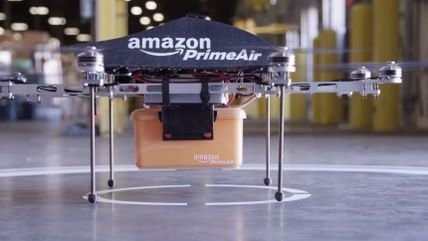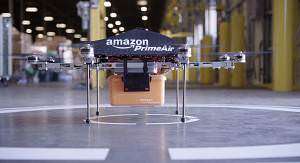Amazon on the FAA: Slower Than Europe
Red tape continues to tether commercial drones.


When your agency's red tape is compared to the regulatory nannies of Europe—particularly the United Kingdom—and you're the one who ends up looking bad, maybe it's time for a major rethinking of things.
It turns out that the Federal Aviation Administration's (FAA) limited approval of a particular unmanned aircraft system (UAS) for Amazon to start doing R&D on drone deliveries is irrelevant. It took so long for the FAA to get its act together (a year for approval), and technological innovations are happening so quickly that the model the FAA approved is now obsolete. Amazon doesn't even fly it anymore.
That's the message Paul Misener, Amazon's vice president of global public policy, had for a Senate subcommittee this week. Furthermore, FAA's foot-dragging in establishing reasonable private, commercial drone regulations is putting it behind European countries, some of whom are not exactly known for a free-wheeling approach to public safety. As reported by Ryan Mac at Forbes:
Dressed in a light gray suit and removing his glasses to address the senators, Misener stressed the differences between the U.S. and places like Europe, where the company is already testing outdoors in the United Kingdom. "Nowhere outside of the United States have we been required to wait more than one or two months to begin testing," he said. That was supported by Senator Cory Booker, who passionately suggested that if the FAA been around during the time of the Wright brothers, other countries would have had commercial planes flying before a U.S. aircraft got off the ground.
We're behind the United Kingdom, guys. They have rules for everything. But they've actually been pretty good at embracing cutting-edge transportation innovations. As Peter Suderman noted in February, the United Kingdom is really pushing to get driverless vehicle technology on the road.
Booker is apparently working on reducing commercial frustrations about drone policies (or rather the blanket ban that has been the result of a lack of policies). According to Forbes, he's trying to craft legislation that would allow commercial use of drones while the FAA continues its incredibly slow process of hammering out regulations. The FAA just recently authorized an interim policy to allow more flights below 200 feet, but a commercial drone lobbying group representative said at the hearing the move wasn't nearly enough.
Editor's Note: As of February 29, 2024, commenting privileges on reason.com posts are limited to Reason Plus subscribers. Past commenters are grandfathered in for a temporary period. Subscribe here to preserve your ability to comment. Your Reason Plus subscription also gives you an ad-free version of reason.com, along with full access to the digital edition and archives of Reason magazine. We request that comments be civil and on-topic. We do not moderate or assume any responsibility for comments, which are owned by the readers who post them. Comments do not represent the views of reason.com or Reason Foundation. We reserve the right to delete any comment and ban commenters for any reason at any time. Comments may only be edited within 5 minutes of posting. Report abuses.
Please to post comments


Hell, in the UK, you can't even broadcast ATC audio because of some WWII regulations. Yet they allow drones?
200 years ago, anyone suggesting that government had anything to say about new projects or ideas (other than the usual crony funding, like the Erie Canal) would have been laughed out of town.
100 years ago, it was common to think government had the duty to inspect meat plants, railroads, etc.
Now it seems to be the default opinion that no new idea can even be floated without imagining the bureaucratic oversight first.
It's awfully depressing. Reminds me of the story in the Foundation series, where a nuclear power station disaster results in closing down all nuclear power stations rather than trying to learn why that one blew up and applying the knowledge to the others. Japan and Germany apparently have already started down that path.
I really wish I could make a decent living off of dog training - it's a complete wild west with ZERO government intervention or regulation. Even certifications are voluntary and only really used for marketing purposes.
"REGULATE IT!"
/too many people I know.
Well there you go. You've just explained why you can't make a decent living from it -- if you could, it would have been regulated, to protec the children, to make sure dog trainers didn't overlook rabies or fleas, or some such excuse.
Anything which can make someone money has the seeds of its own regulation.
The worst of all this overregulation, the most hypocritical aspect, is that people with low skills, low IQ, bad luck, or otherwise on the bottom of society, could help themselves tremendously with cutting hair or cooking for neighbors -- imagine some single mother with a couple of kids who could easily look after other kids at the same time, cook extra meals at the same time, even handle a few fingernails, all to raise enough cash to pay the rent and make a living -- but the nannies who claim to want to help these people have made it impossible for them to help themselves, all in the name of the greater good.
That's why IJ gets so much of my money.
My neighbor tells me stories of her mom making plates of food to sell around the neighborhood. If she had ever gotten "caught", I have no doubt the punishment would be the same as someone selling dope in the alley.
You've just explained why you can't make a decent living from it
Err, I know several people that do.
The precautionary principle strikes again.
The vaping sector, perhaps one of the largest growing economic sectors in the world, is a perfect example.
"Did you get permission to do that?"
But what will be do, if the drone pilot locks the door to his basement bedroom and intentionally crashes a 20-lb box into someone's house.